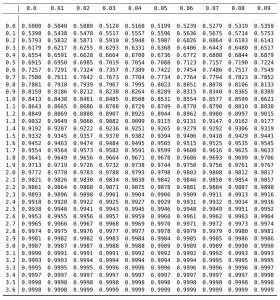Archive for the ‘Programmierung’ Category.
2017-10-22, 15:42
Ich arbeite momentan an einer kleinen Excel-Anwendung, um die wöchentliche Bestellung von meinen Kollegen und mir bei „Danielz Foodtruck“ (https://www.facebook.com/Danielz-Food-Truck-709172459137209/) zu optimieren. Mit reinem VBA kommt man leider nur an den Login-Namen, nicht aber an den eigentlichen Namen des Nutzers:
Sub showUsername()
MsgBox VBA.Environ("Username")
End Sub |
Sub showUsername()
MsgBox VBA.Environ("Username")
End Sub
Die Information steht jedoch im Active Directory, mit ein paar Zeilen VBA (Quelle: https://community.spiceworks.com/topic/361258-using-vba-to-report-user-s-full-name-maybe-from-ad) kann man sie abfragen:
Function GetUsername()
Set objAD = CreateObject("ADSystemInfo")
Set objUser = GetObject("LDAP://" & objAD.UserName)
GetUsername = objUser.DisplayName
End Function |
Function GetUsername()
Set objAD = CreateObject("ADSystemInfo")
Set objUser = GetObject("LDAP://" & objAD.UserName)
GetUsername = objUser.DisplayName
End Function
Uwe Ziegenhagen likes LaTeX and Python, sometimes even combined.
Do you like my content and would like to thank me for it? Consider making a small donation to my local fablab, the Dingfabrik Köln. Details on how to donate can be found here Spenden für die Dingfabrik.
More Posts - Website
2017-10-08, 16:35
For months it has been quiet on this front, recently I have started again my efforts to have a working cluster of Raspberry PIs. I purchased a few Pi 3 (Cyberport offered them for 29,95 Euro a piece), a Logitech 8-port hub (from Pollin, around 10 Euro) that works with 5V and therefore should work by USB power. Right now I built the stack of PIs (4 Pi 2, 4 Pi 3) by connecting all of them using M2.5 nylon spacers from Banggood. As power supply I am using an Aukey PA-T8 USB charger with 10 3.0 USB ports that deliver 70W in total.

Uwe Ziegenhagen likes LaTeX and Python, sometimes even combined.
Do you like my content and would like to thank me for it? Consider making a small donation to my local fablab, the Dingfabrik Köln. Details on how to donate can be found here Spenden für die Dingfabrik.
More Posts - Website
2017-07-30, 18:04
Kürzlich musste ich XML-Tags aus XML-Dateien löschen, um die entsprechenden XML-Dateien etwas übersichtlicher zu gestalten. Der richtige Weg wäre sicher gewesen, einen XSLT-Prozessor zu nutzen, der die entsprechenden Tags ausfiltert, aber mangels Zeit habe ich dann doch ein kleines Python-Skript gebaut. Die zu entfernenden Tags hatten auch keine Properties und ließen sich daher gut entfernen.
def filter(oldfile, newfile, filterStart, filterEnd):
killFlag = 0
with open(newfile, 'w') as outfile, open(oldfile, 'r', encoding='utf-8') as infile:
for line in infile:
strIndex = line.find(filterStart)
if (strIndex > -1) | (killFlag == 1):
killFlag = 1
else:
outfile.write(line)
strIndex2 = line.find(filterEnd)
if (strIndex2 > -1):
killFlag = 0
filter('somexmlfile.xml', 'somefilteredxml.xml', '<xs:annotation>', '</xs:annotation>') |
def filter(oldfile, newfile, filterStart, filterEnd):
killFlag = 0
with open(newfile, 'w') as outfile, open(oldfile, 'r', encoding='utf-8') as infile:
for line in infile:
strIndex = line.find(filterStart)
if (strIndex > -1) | (killFlag == 1):
killFlag = 1
else:
outfile.write(line)
strIndex2 = line.find(filterEnd)
if (strIndex2 > -1):
killFlag = 0
filter('somexmlfile.xml', 'somefilteredxml.xml', '<xs:annotation>', '</xs:annotation>')
Uwe Ziegenhagen likes LaTeX and Python, sometimes even combined.
Do you like my content and would like to thank me for it? Consider making a small donation to my local fablab, the Dingfabrik Köln. Details on how to donate can be found here Spenden für die Dingfabrik.
More Posts - Website
2017-07-30, 17:56
Als TeXie mag man es nicht glauben, aber in Powerpoint gibt es keine eingebaute Möglichkeit, die Gesamtzahl der Folien auf der Folie selbst auszugeben. Über den Umweg VBA geht es (gefunden unter https://superuser.com/questions/130489/insert-total-number-of-slides-in-powerpoint-2007)
Sub numberSlides()
' https://superuser.com/questions/130489/insert-total-number-of-slides-in-powerpoint-2007
' run with F5
Dim s As Slide
Dim shp As Shape
For Each s In ActivePresentation.Slides
s.DisplayMasterShapes = True
s.HeadersFooters.SlideNumber.Visible = msoTrue
For Each shp In s.Shapes
If Left(shp.Name, 12) = "Slide Number" Then
shp.TextFrame.TextRange.Text = s.SlideNumber & " von " & ActivePresentation.Slides.Count
End If
Next
Next
End Sub
Uwe Ziegenhagen likes LaTeX and Python, sometimes even combined.
Do you like my content and would like to thank me for it? Consider making a small donation to my local fablab, the Dingfabrik Köln. Details on how to donate can be found here Spenden für die Dingfabrik.
More Posts - Website
Category:
MS Office & VBA |
Kommentare deaktiviert für Gesamtfolienzahl in Powerpoint einfügen
2017-05-04, 20:30
Nachdem mir ein Kollege in der Firma gezeigt haben, wie er Emacs produktiv einsetzt, wird es jetzt Zeit, Emacs deutlich intensiver und ausführlicher zu behandeln. Meine Erfahrungen werde ich in einem Skript sammeln, das passende Github-Repo für den TeX-Code habe ich bereits angelegt. Wer mitmachen möchte, kann sich gern bei mir melden.
Github Repo
Hier noch ein empfehlenswerter Link zu vielen Emacs-Themen: https://github.com/emacs-tw/awesome-emacs
Uwe Ziegenhagen likes LaTeX and Python, sometimes even combined.
Do you like my content and would like to thank me for it? Consider making a small donation to my local fablab, the Dingfabrik Köln. Details on how to donate can be found here Spenden für die Dingfabrik.
More Posts - Website
2017-03-25, 08:09
One of the many approximations of Pi is the Gregory-Leibniz series (image source Wikipedia):

Here is an implementation in Python:
# -*- coding: utf-8 -*-
"""
Created on Sat Mar 25 06:52:11 2017
@author: Uwe Ziegenhagen
"""
sum = 0
factor = -1
for i in range(1, 640000, 2):
sum = sum + factor * 1/i
factor *= -1
# print(sum)
print(-4*sum) |
# -*- coding: utf-8 -*-
"""
Created on Sat Mar 25 06:52:11 2017
@author: Uwe Ziegenhagen
"""
sum = 0
factor = -1
for i in range(1, 640000, 2):
sum = sum + factor * 1/i
factor *= -1
# print(sum)
print(-4*sum)
Uwe Ziegenhagen likes LaTeX and Python, sometimes even combined.
Do you like my content and would like to thank me for it? Consider making a small donation to my local fablab, the Dingfabrik Köln. Details on how to donate can be found here Spenden für die Dingfabrik.
More Posts - Website
2017-03-20, 20:14
Durch eine SX Frage bin ich auf das Verfahren der „Russischen Bauernmultiplikation“ gestoßen, mit der man ohne Multiplikation ganzzahlige Zahlen miteinander multiplizieren kann. Just for Fun hier die Python-Implementierung:
# -*- coding: utf-8 -*-
"""
Created on Sat Mar 18 10:04:40 2017
@author: Uwe Ziegenhagen
"""
import pandas as pd
from math import floor
def russianPeasantMultiply(a, b):
assert a > 1
assert b > 0
data = pd.DataFrame([[a, b]], columns=list('ab'))
while a > 1:
a = floor(a/2)
b = b + b
data.loc[len(data)]=[a, b]
data = data[data['a'] % 2 == 1]
return(data.b.sum())
print(russianPeasantMultiply(63, 17)) |
# -*- coding: utf-8 -*-
"""
Created on Sat Mar 18 10:04:40 2017
@author: Uwe Ziegenhagen
"""
import pandas as pd
from math import floor
def russianPeasantMultiply(a, b):
assert a > 1
assert b > 0
data = pd.DataFrame([[a, b]], columns=list('ab'))
while a > 1:
a = floor(a/2)
b = b + b
data.loc[len(data)]=[a, b]
data = data[data['a'] % 2 == 1]
return(data.b.sum())
print(russianPeasantMultiply(63, 17))
Ohne pandas geht es sicher auch, aber pandas macht es etwas einfacher…
Uwe Ziegenhagen likes LaTeX and Python, sometimes even combined.
Do you like my content and would like to thank me for it? Consider making a small donation to my local fablab, the Dingfabrik Köln. Details on how to donate can be found here Spenden für die Dingfabrik.
More Posts - Website
2017-03-14, 07:59
Here’s a simple example how one can generate a normal distribution table with Python and scipy so that it can be imported into LaTeX.
Example-03.zip
# -*- coding: utf-8 -*-
"""
Created on Mon Mar 13 21:14:17 2017
@author: Uwe Ziegenhagen, ziegenhagen@gmail.com
Creates a CDF table for the standard normal distribution
use booktabs package in the preamble and put
the generated numbers inside (use only one backslash!)
\\begin{tabular}{r|cccccccccc} \\toprule
<output here>
\\end{tabular}
"""
from scipy.stats import norm
print(norm.pdf(0))
print(norm.cdf(0),'\r\n')
horizontal = range(0,10,1)
vertikal = range(0,37)
header = ''
for i in horizontal:
header = header + '& ' + str(i/100)
print(header, '\\\\ \\midrule')
for j in vertikal:
x = j/10
print('\\\\', x)
for i in horizontal:
y = x + i/100
print('& ', "{:10.4f}".format(norm.cdf(y),4))
print('\\\\ \\bottomrule \r\n') |
# -*- coding: utf-8 -*-
"""
Created on Mon Mar 13 21:14:17 2017
@author: Uwe Ziegenhagen, ziegenhagen@gmail.com
Creates a CDF table for the standard normal distribution
use booktabs package in the preamble and put
the generated numbers inside (use only one backslash!)
\\begin{tabular}{r|cccccccccc} \\toprule
<output here>
\\end{tabular}
"""
from scipy.stats import norm
print(norm.pdf(0))
print(norm.cdf(0),'\r\n')
horizontal = range(0,10,1)
vertikal = range(0,37)
header = ''
for i in horizontal:
header = header + '& ' + str(i/100)
print(header, '\\\\ \\midrule')
for j in vertikal:
x = j/10
print('\\\\', x)
for i in horizontal:
y = x + i/100
print('& ', "{:10.4f}".format(norm.cdf(y),4))
print('\\\\ \\bottomrule \r\n')

Uwe Ziegenhagen likes LaTeX and Python, sometimes even combined.
Do you like my content and would like to thank me for it? Consider making a small donation to my local fablab, the Dingfabrik Köln. Details on how to donate can be found here Spenden für die Dingfabrik.
More Posts - Website
2017-03-12, 12:52
http://stackoverflow.com/questions/4485610/python-message-box-without-huge-library-dependancy zeigt, wie man Windows Standard-Dialoge (wie MessageBox und JaNeinAbbrechen) mit Python auswerten kann:
# using ctypes
import ctypes
MessageBox = ctypes.windll.user32.MessageBoxW
MessageBox(None, 'Hello World', 'This is the window title', 0)
# using win32ui
import win32ui
win32ui.MessageBox('This is the message', 'Window Title')
# using win32con
import win32con
result = win32ui.MessageBox('The Message', 'The Title', win32con.MB_YESNOCANCEL)
if result == win32con.IDYES:
win32ui.MessageBox('You pressed "Yes"')
elif result == win32con.IDNO:
win32ui.MessageBox('You pressed "No"')
elif result == win32con.IDCANCEL:
win32ui.MessageBox('You pressed "Cancel"') |
# using ctypes
import ctypes
MessageBox = ctypes.windll.user32.MessageBoxW
MessageBox(None, 'Hello World', 'This is the window title', 0)
# using win32ui
import win32ui
win32ui.MessageBox('This is the message', 'Window Title')
# using win32con
import win32con
result = win32ui.MessageBox('The Message', 'The Title', win32con.MB_YESNOCANCEL)
if result == win32con.IDYES:
win32ui.MessageBox('You pressed "Yes"')
elif result == win32con.IDNO:
win32ui.MessageBox('You pressed "No"')
elif result == win32con.IDCANCEL:
win32ui.MessageBox('You pressed "Cancel"')
Uwe Ziegenhagen likes LaTeX and Python, sometimes even combined.
Do you like my content and would like to thank me for it? Consider making a small donation to my local fablab, the Dingfabrik Köln. Details on how to donate can be found here Spenden für die Dingfabrik.
More Posts - Website
2017-03-12, 09:38
Hier ein kurzes Beispiel, wie man mittels melt bestimmte Daten in die richtige Form bekommt.
Ausgangspunkt ist der folgende Datensatz:

Zum Auswerten ist der nicht optimal, ich möchte die Monatswerte gern untereinander haben. Mittels melt geht das ganz einfach:
# -*- coding: utf-8 -*-
import pandas as pd
data = pd.read_excel('meltdata.xlsx')
print(data.shape[1], 'columns and', data.shape[0], 'rows')
print(list(data))
melted = pd.melt(data, id_vars=['Name', 'ColumnB', 'ColumnC'],
value_vars=['Januar', 'Februar', 'März', 'April', 'Mai',
'Juni', 'Juli', 'August', 'September', 'Oktober',
'November', 'Dezember'])
print(melted) |
# -*- coding: utf-8 -*-
import pandas as pd
data = pd.read_excel('meltdata.xlsx')
print(data.shape[1], 'columns and', data.shape[0], 'rows')
print(list(data))
melted = pd.melt(data, id_vars=['Name', 'ColumnB', 'ColumnC'],
value_vars=['Januar', 'Februar', 'März', 'April', 'Mai',
'Juni', 'Juli', 'August', 'September', 'Oktober',
'November', 'Dezember'])
print(melted)
Name ColumnB ColumnC variable value
0 Donald 1978-09-03 Hello Januar 98
1 Micky 1945-05-04 World Januar 29
2 Minnie 1946-07-05 Foo Januar 57
3 Pluto 1998-07-08 Bar Januar 28
4 Donald 1978-09-03 Hello Februar 31
5 Micky 1945-05-04 World Februar 41
6 Minnie 1946-07-05 Foo Februar 24
...
Uwe Ziegenhagen likes LaTeX and Python, sometimes even combined.
Do you like my content and would like to thank me for it? Consider making a small donation to my local fablab, the Dingfabrik Köln. Details on how to donate can be found here Spenden für die Dingfabrik.
More Posts - Website


